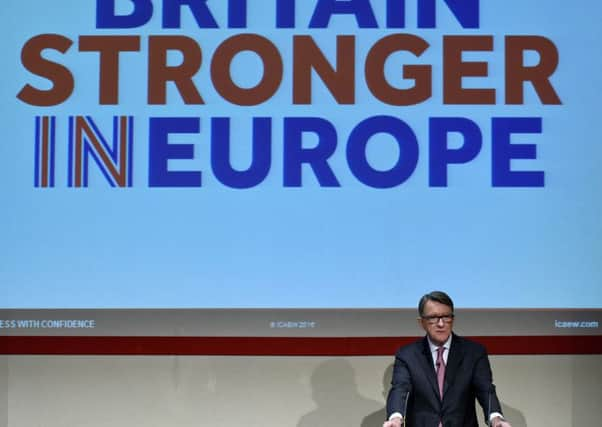Lord Mandelson: Firms face '˜years of uncertainty' after Brexit


The ex-business secretary said that negotiating a free trade deal with the EU following a vote to Leave would be “harder than Brexiters think”.
He claimed for every sympathetic politician in the other 27 member states there would be others who believe the UK “must not be given a quick or easy ride”.
Advertisement
Hide AdAdvertisement
Hide AdThe Labour peer warned that without the benefit of EU trade deals with international markets, British cars, whisky and textiles could attract tariffs of 20% or more.
“Being part of a powerful trade bloc is an advantage not a straitjacket and one with a long track record of success,” he said.
“The EU is probably the world’s leading rule setter in international trade and this is a significant strength for Britain,” Lord Mandelson added.
In a speech in the City of London, the former EU trade commissioner said : “Brexiters cannot argue that we are weakened in the EU as it is but would suddenly be strong enough to dictate terms if we left. For every politician who saw the pragmatic case for dealing with the UK, there would be another who had little doubt that the UK must not be given a quick or easy ride.”
Brussels, he believes, would insist on the UK signing up again to common standards in order to gain access to the single market following a vote to leave in the June 23 referendum.
“As a result, we would have left the EU in order to assert our national sovereignty only to find that, as a condition of access, we did not have independence from EU regulation after all,” he said.
A free trade agreement (FTA) would take years to negotiate stretching beyond the two year period for settling the UK’s terms of exit from the EU, he claimed.
Lord Mandelson added: “The negotiation would mean years of uncertainty and in the worst case scenario a return to paying EU tariffs while a final deal on an FTA was struck.
Advertisement
Hide AdAdvertisement
Hide Ad“Even a low tariff can change the calculus of a supply chain economy in a highly cost-sensitive global economy and for the large volume of trade that we hope would continue, that could be a considerable sum of money.”
British consumers could also face paying higher prices because “the UK would also potentially have to raise its own tariffs on imports from these markets as they would no longer be covered by WTO-compliant agreements”.
Speaking to the BBC Radio 4 Today programme earlier, Lord Mandelson dismissed claims that the Remain camp are engaging in a politics of fear.
He said Britain would be “heading in a completely unknown direction and taking an unknown route” if it votes to leave because no country has ever left the EU before.
“I’ve reached the conclusion that the political aims of those who are seeking to leave the European Union will undoubtedly damage British business, British jobs and British investment.
Labour Eurosceptic Gisela Stuart, who is on the board of Vote Leave, said the Labour Party has failed to face up to the realities of the European project.
The MP for Birmingham Edgbaston told the Today programme: “Something really curious has happened, and that is, ever since Maastricht, when we on the Labour side looked at the Tories tearing themselves apart over Europe, I think we have stopped thinking about what the European Union really means.”
Ms Stuart said the European project was causing the Greek government to sell out a generation of young workers in a bid to save the euro.
Advertisement
Hide AdAdvertisement
Hide AdAnd she dismissed claims that the EU had helped keep the peace in Europe as a “rather curious reading of history”, saying the political stability it had helped to create is now being “seriously questioned”.
She said: “France and Germany coming together within the envelope of Nato and the collective security - that is what has kept the peace.
“What the European Union, up to a certain point, provided for was a political stability within a defence framework.
“But if you are looking at what is happening across the European Union now - and the refugee crisis is just the latest demonstration - that political stability is being seriously questioned, and the European Union as an institution is not responding to it properly.”
